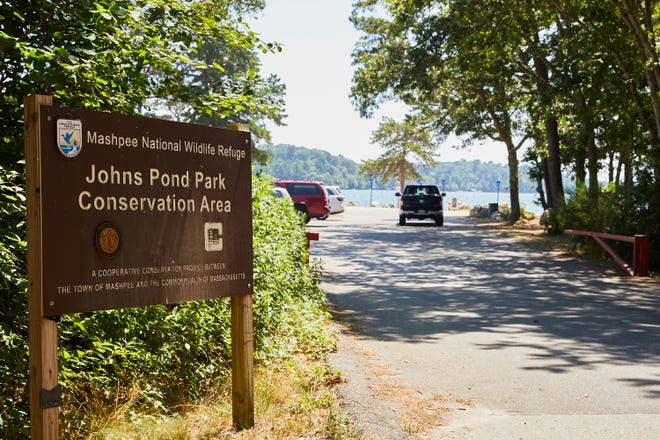PFAS advisory: State asks people to limit or not eat fish caught at 5 Cape Cod ponds
Cynthia McCormick
Cape Cod Times
Nov. 3, 2021
In their first advisory about consumption of freshwater fish contaminated with PFAS, Massachusetts public health officials Tuesday advised people to limit or exclude fish from five Upper Cape ponds from their diet.
Individuals particularly susceptible to PFAS exposure — children under 12, women of child-bearing age and pregnant and nursing women — were advised not to consume any fish caught in Flax Pond in Bourne, Grews and Jenkins ponds in Falmouth and Johns Pond in Mashpee.
The state Department of Public Health said this group of women and children also were advised not to eat largemouth and smallmouth bass from Mashpee-Wakeby Pond in Mashpee and Sandwich and to limit other species to one meal a week.

PFAS refers to a group of man-made chemicals with bonds so strong and stable they don’t break down in nature and are known as “forever chemicals.”
DPH officials said they tested the fish at the five freshwater ponds because they are popular locations for fishing and because they are located on or near Joint Base Cape Cod, where PFAS contamination has been found in ground and surface water.
The state consumption guidelines concern native fish and not stocked trout that are raised in fish hatcheries and released.
Experts explain PFAS in fish
The most restrictive guidelines were from Johns Pond, where the general public was advised not to eat smallmouth bass and to limit other species to one meal a year.
“I’m a little taken aback,” said Andrew Gottlieb, executive director of the Association to Preserve Cape Cod.
“You’d like to think you could put a line in the water, catch a native fish and not ingest chemicals that might be jeopardizing your health,” Gottlieb said.
Laurel Schaider, senior scientist at the Silent Spring Institute in Newton, which has tested for and found PFAS contamination in Cape Cod drinking water wells, said she’s happy that the state is “taking PFAS seriously and testing fish in ponds known to have PFAS contamination.”
“You can remove PFAS from well water with filters. Unfortunately, there’s no way to remove PFAS from fish,” Schaider said.
PFAS contamination:Of 21 Barnstable ponds tested, 21 had contaminants, town report finds
PFAS drinking water limits set
Massachusetts adopted PFAS standards for drinking water in October of 2020, which has led to testing of public water supplies, Schaider said.
“It’s not surprising to find PFAS in fish, particularly in areas where groundwater and surface water are contaminated with PFAS from firefighting foams,” she said.
State officials also tested surface water at the five ponds and at 11 other freshwater locations for PFAS, but the chemicals were not found at levels that made it unsafe for swimming or other recreational activities.
PFAS exposure has been found to impact liver and kidney function, thyroid hormone and cholesterol levels, and the immune system, the DPH said.
It also can impact fetal development and is associated with an increased risk of cancer following long-term exposure.
PFAS is found in heat-, oil- and water-resistant coatings in many consumer products, including cookware, food and product packaging, water and fire-resistant fabrics, films and wires.
Contamination at base, academy
The contamination at Joint Base Cape Cod is associated with firefighting foams used in training exercises.
Doug Karson, community involvement lead for the Air Force Civil Engineer Center at Joint Base Cape Cod, said the Air Force has installed monitoring wells in areas near the contaminated ponds and is developing a remediation plan as part of a Superfund project.
Karson said he expects the Air Force to develop a response plan for potential treatment of contaminated soil and groundwater.
If groundwater gets cleaned up, “the ponds will turn in a favorable direction,” Karson said.
The public will be involved in the process through community meetings, he said.
This week the Air Force installed municipal water lines to seven homes on Valley Farm Road in Pocasset due to concerns about PFAS contamination from a tanker truck that was smothered in foam when it flipped over on the Otis Rotary in 2000.
The Air Force also will put municipal water lines in place at locations in Mashpee and Falmouth, Karson said.
PFAS contamination is also a concern in the town of Barnstable, where the chemical, linked to firefighting foams, has shown up in wells.
“Once it’s in the environment, it’s hard to get out,” Gottlieb said. “And once it’s in biological tissue, it’s really hard to get out.”
“The fact that the Massachusetts Department of Public Health felt they needed to look at ponds close to the base is yet another example of how Joint Base Cape Cod has degraded the environmental quality of water on the Upper Cape in ways we’re only beginning to understand, (even) after 20-plus years of dealing with contamination from military activities on the base.”
It’s why people are so concerned about possible threats to the drinking water from a proposed Massachusetts National Guard machine gun range at the base, Gottlieb said.
DPH officials said they issue recommendations on freshwater fish consumption when the levels of PFAS exceed 0.22 micrograms of PFAS per kilogram of fish tissue (also known as 0.22 parts per billion.
“At concentrations above this level, the unlimited consumption of fish (e.g., 7 days per week) by certain sensitive individuals would not be advised,” the DPH said.
Surface water was found to be safe for swimming and recreational activities at Shubael Pond in Barnstable; Flax Pond, Hen Cove and Squeteague Harbor in Bourne; Crooked, Mares, Flax, Jenkins, Grews and Round ponds in Falmouth; Santuit and Johns ponds in Mashpee and Peter’s, Snake and Triangle ponds in Sandwich as well as Mashpee-Wakeby Pond in Mashpee and Sandwich.
The DPH advised the general public to limit fish caught at Flax Pond, also known as Picture Lake, in Bourne and Jenkins Pond in Falmouth to one meal a week and to limit fish caught at Grews Pond in Falmouth to two meals a week.
The general public was advised to limit largemouth and smallmouth bass caught at Mashpee-Wakeby Pond to two meals a week and to limit other species to one meal a week.
The DPH Freshwater Fish Consumption Advisory List also includes more than two dozen Cape water bodies contaminated by mercury, including the five Upper Cape ponds with fish contaminated with PFAS.
Email Cynthia McCormick at cmccormick@capecodonline.com.
PFAS, wells and bills: Chatham voters approve water capital articles worth $5.9 million
Keating: Air Force agrees to pay for PFAS cleanups in Mashpee and Falmouth wells
